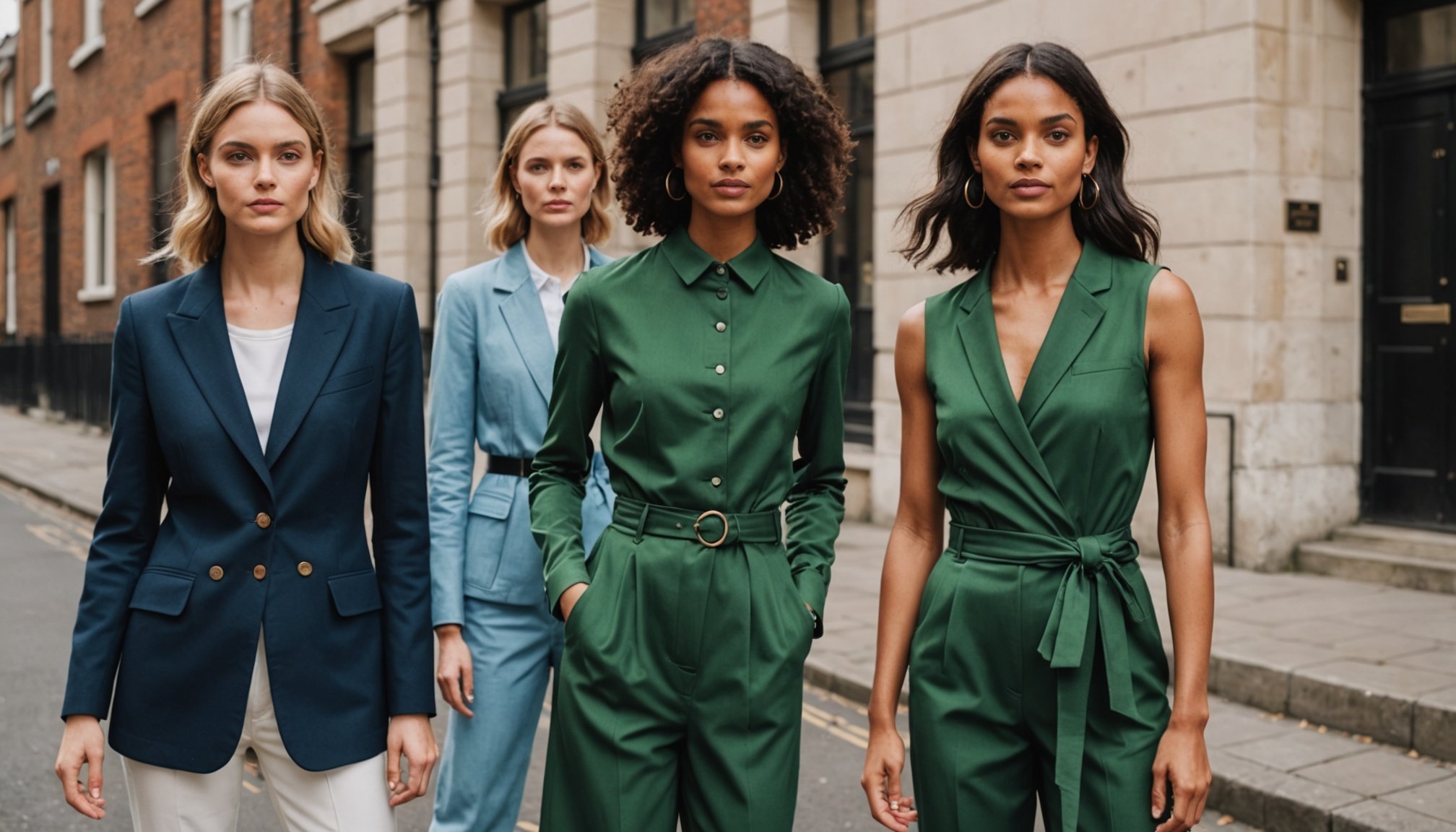Overview of Vegan and Cruelty-Free Fabrics
Vegan fabrics are materials that do not use any animal products, catering specifically to those who adopt cruelty-free lifestyles. Unlike traditional materials which often include leathers and wools, vegan fabrics incorporate sustainable materials such as hemp, organic cotton, and natural rubber. Cruelty-free textiles further distinguish themselves by ensuring that no harm comes to animals throughout their production processes.
Cruelty-free textiles stand as an essential part of the sustainable fashion movement. They provide innovative alternatives that lessen ecological footprints, contributing positively to environmental conservation by eliminating the hefty resource demands associated with animal-based fabrics. Such fabrics perform a crucial role in paving the way for a sustainable fashion future, fostering eco-consciousness within the industry.
Have you seen this : Elevate Your Winter Wardrobe: Explore Opulent Textures for Chic London Outfits
The contrast between traditional and innovative vegan materials showcases the importance of this shift. Historically, materials such as leather have dominated fashion, but vegan fabrics like Piñatex, derived from pineapples, and cork leather are revolutionizing the industry. Sustainable materials allow for the creativity of design without ethical compromises, indicating a path forward where fashion can be both stylish and responsible.
Ultimately, vegan fabrics serve as a testament to the growing importance of ethical production in fashion, emphasizing a harmonious relationship between style and environmental stewardship.
In the same genre : Elevate Your Winter Wardrobe: Explore Opulent Textures for Chic London Outfits
Types of Vegan and Cruelty-Free Fabrics
Exploring types of vegan fabrics reveals a diverse array of innovative and eco-friendly materials paving the way for sustainable fashion. These cruelty-free options are crucial as the demand for ethical and sustainable clothing rises.
Alternatives to Leather
Innovative sustainable textiles like Piñatex, made from pineapple leaves, and cork leather offer exciting substitutes for traditional leather. These options not only dodge the ecological drawbacks of leather production but also provide unique textures and properties that appeal to consumers seeking more eco-friendly materials.
Plant-Based Fibers
Plant-based fibers such as hemp, bamboo, and organic cotton are celebrated for their minimal environmental impact. Grown with fewer pesticides and less water, these materials contribute significantly to the sustainable textiles movement, appealing to eco-conscious consumers dedicated to reducing their carbon footprint.
Synthetic Innovations
New synthetic innovations keep pace with demand for cruelty-free textiles. Materials like recycled polyester and elastane derived from renewable resources present durable and versatile options for both designers and consumers. By incorporating these ingredients, the fashion industry progressively shifts towards sustainable textiles and eco-friendly materials, signalling a more responsible approach to fashion.
In summary, the spectrum of vegan and cruelty-free fabrics spans from natural plant fibers to cutting-edge synthetics, each offering unique benefits in the pursuit of a more sustainable future.
Brands Leading the Change
Vegan fashion brands are at the forefront of transforming the industry, championing sustainable clothing through cruelty-free companies. Established fashion labels are setting the tone for ethical fashion by incorporating vegan fabrics and promoting sustainable practices. These brands often boast expansive collections that incorporate sustainable materials, ensuring that style need not compromise environmental values. With years-long reputations, they succeed in mainstreaming ethical trends.
Meanwhile, emerging startups are injecting fresh energy into the market, driven by a commitment to innovative textiles and eco-friendly methods. These newcomers leverage the appeal of unique, cruelty-free designs that resonate with modern consumers. Their agility in adopting cutting-edge technologies makes them indispensable players in shaping the future of sustainable fashion.
Collaborations and partnerships are proving pivotal, as established brands and fledgling startups together strive to expand the reach of sustainable clothing. These alliances offer diversified product lines and broaden consumer access to cruelty-free textiles, magnifying their collective impact on the industry.
By leading the charge towards ethical and sustainable practices, these vegan fashion brands do more than offer alternatives; they redefine the paradigm of modern fashion, creating an industry where ethics and aesthetics coalesce.
Current Fashion Trends Influenced by Vegan Fabrics
In the UK fashion scene, vegan fashion movements are gaining notable traction, standing as a testament to their growing significance. As consumers increasingly favour clothing that aligns with ethical values, these movements reflect an industry-wide shift towards more cruelty-free styles. Traditionally dominated by animal-based products, the fashion industry is now witnessing a robust adoption of vegan fabrics in mainstream fashion.
Social media and celebrity endorsements have played a pivotal role in driving this transformation. Celebrities advocating for cruelty-free textiles influence countless followers, who then emulate these choices, emphasizing style without ethical compromises. This trend not only magnifies the visibility of vegan options but also fosters widespread acceptance among diverse consumer demographics.
Furthermore, fashion trends in the UK are diversifying as designers integrate sustainable materials into their collections. The appeal of unique textures and colours offered by innovative textiles like Piñatex and cork leather resonates with consumers eager for originality fused with ethics. This confluence of style and responsibility encapsulates the evolving landscape of fashion trends, underpinning a move towards a more conscious and eco-friendly approach to dressing.
Thus, the ascending allure of vegan fabrics is reshaping the UK’s fashion narrative, paving the path for a more ethical future.
Environmental Benefits of Vegan Fabrics
The shift towards eco-friendly fashion reveals significant ecological advantages compared to traditional textiles. Vegan fabrics, created without animal products, often entail fewer natural resources, leading to a decreased environmental impact. These sustainable fabrics often utilise materials like hemp or bamboo, which grow rapidly and require minimal chemical inputs. This efficiency reduces energy consumption and leads to a markedly lower carbon footprint.
Furthermore, adopting vegan fabrics addresses waste reduction. Animal-based materials typically demand extensive processing, which produces pollutants. In contrast, plant-based or recycled synthetics contribute to less waste, aligning with global sustainability goals. For example, recycled polyester not only repurposes plastic waste but also diminishes landfill contributions.
Long-term sustainability benefits are evident as vegan textiles foster circular fashion economies. By promoting biodegradable or easily recyclable materials, they ensure reduced lifecycle impacts. This aligns with industry movements toward zero-waste production. Additionally, companies adopting these materials often invest in renewable energy and closed-loop systems, enhancing their sustainability index.
The integration of sustainable fabrics within fashion is pivotal for minimizing ecological harm. It not only meets current environmental needs but also paves the way for emerging sustainable technologies that promise a greener future. As demand grows, the market for vegan fabrics expands, encouraging further eco-conscious innovations.
Consumer Attitudes Towards Vegan and Cruelty-Free Fashion
In the evolving landscape of sustainable shopping, there is a marked shift in consumer behavior towards more ethical choices. This transition is underpinned by growing awareness and empathy for environmental and animal welfare issues, leading to a significant rise in the demand for ethical fashion trends.
Recent market research highlights that a substantial portion of UK consumers now prioritises ethical and sustainable products. They are more inclined to purchase from brands that offer cruelty-free textiles, reflecting strong ethical beliefs that influence their purchasing decisions. This consumer preference towards sustainable shopping is driven not only by environmental considerations but also by the desire to support companies with ethical practices.
As the demand for sustainable products continues to grow, businesses are compelled to respond. Brands adhering to ethical fashion trends are more likely to see an uptick in popularity among conscientious shoppers. Moreover, the integration of vegan fabrics into mainstream fashion allows consumers to make responsible choices without sacrificing style.
The trajectory of consumer behavior exemplifies a broader societal shift towards sustainability, highlighting the intersection of ethics and fashion. As awareness expands, the marketplace increasingly reflects a collective push for responsibility, with consumers steering the industry towards a more sustainable future.
Future Trends in Vegan and Cruelty-Free Fashion
The future of fashion is increasingly intertwined with the development of innovative textiles, as the industry seeks to adopt sustainable trends. One can anticipate that fabric technology will continue to advance, introducing materials that are not only plant-based but also biodegradable and energy-efficient. These developments are poised to streamline production processes, reducing the reliance on resource-intensive methods and lowering emissions.
Consumer behavior is likely to shift further towards sustainability, as ethical awareness deepens. Shoppers might demand transparency and traceability from brands, encouraging manufacturers to disclose the origins and environmental impact of their products. This trend will likely prompt greater industry adoption of innovative textiles.
Legislative measures could also influence the trajectory of sustainable trends. Potential regulations might enforce stricter environmental standards for fashion production, compelling companies to innovate or face penalties. Such laws could herald a new era where cruelty-free textiles become the industry standard.
Thus, the evolving landscape of vegan fashion is marked by technological innovations, consumer-driven changes, and possibly regulatory interventions. This progression aligns with a global push towards environmental responsibility, where ethical fashion is not just a trend, but an enduring commitment.










